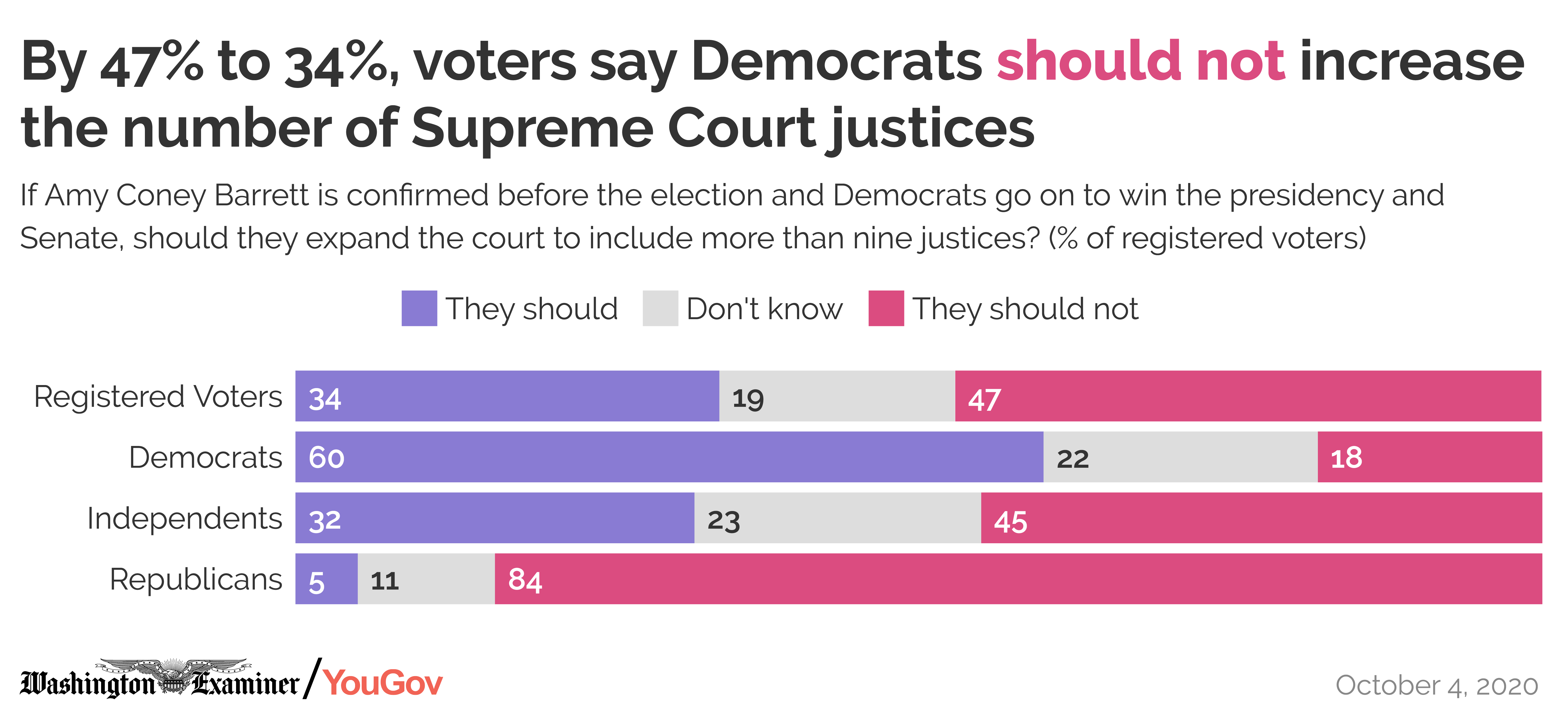Only 1 in 3 registered voters favor a Democratic proposal to expand the Supreme Court in order to install a liberal majority, according to a new poll.
A Washington Examiner/YouGov poll found that 47% oppose growing the Supreme Court beyond its current nine members, while only 34% back the idea, popularly known as “court-packing.” Even among the 60% of Democrats who want to expand the nation’s highest court, half prefer it to be ideologically balanced, and fewer desire a liberal majority.

If the Supreme Court is expanded, just 11% of all voters want its composition to be “overwhelmingly liberal,” compared to 47% who would like to see it balanced. Democrats support a balanced court over a liberal majority by 52% to 38%.
The poll also found that the majority of respondents considered the Supreme Court nomination important to their voting this November, with 58% considering it “very important,” while another 21% said it was “somewhat important.”
This survey was conducted on Sunday among 1,200 registered voters and has a margin of error of plus or minus 3.6 pecentage points.
The current court has a narrow 5-3 conservative majority, with one vacancy following the death of Justice Ruth Bader Ginsburg. Chief Justice John Roberts, a Republican appointee, serves as a key swing vote who occasionally sides with liberals on closely decided cases.
The confirmation of President Trump’s latest nominee, Amy Coney Barrett, tapped to fill the vacant seat, would change the court makeup to a 6-3 conservative majority.
Democrats have increasingly touted court-packing in response to Trump’s conservative nominees to the high court. After conservative Justice Antonin Scalia died in early 2016, Senate Republicans blocked consideration of Barack Obama’s nominee Merrick Garland for almost a year, only to confirm Trump’s choice of Neil Gorsuch quickly in 2017.
“[Senate Majority Leader] Mitch McConnell set the precedent,” tweeted Sen. Ed Markey, a Massachusetts Democrat. “No Supreme Court vacancies filled in an election year. If he violates it, when Democrats control the Senate in the next Congress, we must abolish the filibuster and expand the Supreme Court.”
House Judiciary Committee Chairman Jerry Nadler, a New York Democrat, has signaled support for the proposal if Trump loses and a lame-duck Senate confirms Barrett anyway following the election. “Congress would have to act and expanding the court would be the right place to start,” he tweeted.
In 2018, Justice Anthony Kennedy retired, and Trump nominated Brett Kavanaugh to succeed him. Kavanaugh faced highly contentious confirmation hearings and was ultimately approved by the smallest margin of any successful nominee in 137 years.
Some liberals regard these seats as “stolen” from the Democrats. “And tomorrow, MoveOn members and our allies are taking to the streets across the country in a show of force to stop Trump, McConnell, and the GOP from stealing RBG’s seat,” said the left-wing group in a statement. Markey also said that if Barrett is confirmed, “Republicans will have stolen two Supreme Court justices.”
The Supreme Court has had nine justices since 1869, but the number is not fixed by the Constitution and could be changed by legislation.
Democratic presidential nominee Joe Biden has been reluctant to support court-packing legislation during the primaries, but he has been mum on the idea in the general election campaign. The former vice president refused to answer moderator Chris Wallace’s question about it at the first presidential debate, even as Trump repeatedly pressed him on the subject.
“Whatever position I take on that, that will become the issue,” Biden said. “The issue is the American people should speak.”
“Are you going to pack the court?” Trump demanded. “He doesn’t want to answer the question.”
“I’m not going to answer the question because the question is … will you shut up, man?” Biden replied.
The Senate has scheduled confirmation hearings for Barrett later this month.

